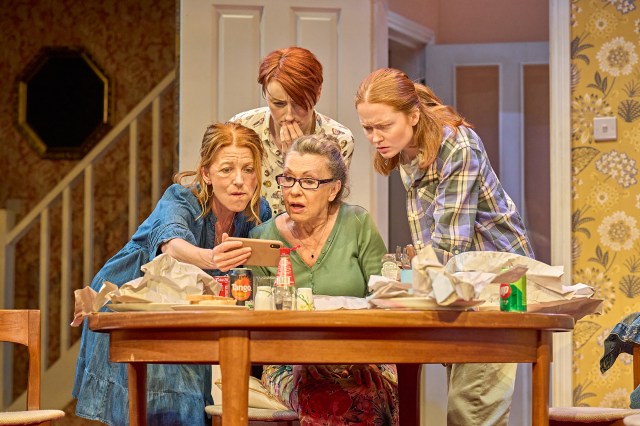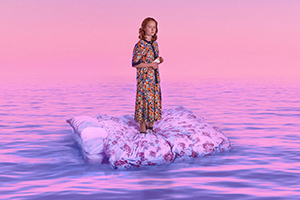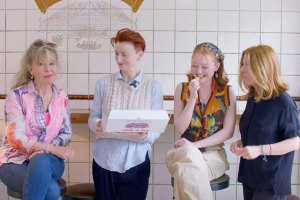Cuckoo at Royal Court Theatre – review
Vicky Featherstone’s production continues in London until 19 August before transferring to Liverpool Everyman

The cuckoo bird is a brood parasite, the female notorious for laying her eggs in another bird’s nest, her offspring usurping said bird’s own young. The term “cuckoo” is also slang for a bit mad, or bonkers. So, Michael Wynne’s rather lovely, if uneven, new play is perfectly named. It presents three generations of working-class women whose scale of abilities to deal successfully with life seems to run in the opposite direction to their chronological ages, with the grandmother of the family most likely to endure in the event of global or personal catastrophe.
Set in Wynne’s native Birkenhead, it centres on eccentric, good-natured widow Doreen (Sue Jenkins, in an absolutely gorgeous performance) who finds her home invaded by needy daughters Carmel and Sarah (Michelle Butterly and Jodie McNee respectively, both flawless) but especially by troubled granddaughter Megyn (Emma Harrison, making a fine professional debut) who takes refuge in her grandmother’s bed and refuses to come out.
Megyn’s unusual behaviour is precipitated by a discussion of climate change amongst the four women but we never find out if that truly is her problem, or if she’s just being a teenager, as her worn-down mother would have it. The climate change issue feels a little shoe-horned in, and ends up as a bit of a thematic non sequitur. Similarly, the root cause of Megyn’s trauma remains frustratingly under-explored, despite being given a disproportionate amount of stage time.
Her mother Carmel isn’t immune to night terrors either, although her more pragmatic, potty-mouthed approach to life is driven by the necessities of being the sole breadwinner. Meanwhile, Sarah is in thrall to an unseen new dentist boyfriend (“has he got lovely teeth? Dentists always have lovely teeth” enquires Doreen before going on to observe “he must be clever to be a dentist. Maybe not doctor-clever but he’d still have to be bright.”)
Where Cuckoo really soars is in its depiction of a quartet of women whose deep affection for each other is often clouded by misjudgement and petty irritation. I’ve no idea if it’s based on Wynne’s own family, but the observation of the relationship dynamics – the easy silences, the casual cruelties, the lightning-fast switches in mood and attention – feels extraordinarily accurate. He captures wonderfully the often bizarre foibles and attitudes of apparently ordinary people.
The characterisations are so relatable, and most of the dialogue laugh-out funny, like something from the pen of a scouse Victoria Wood, that it’s a shame that some of the more ponderous stuff tends to keep the show earthbound. Long stretches of the play are spent watching the characters on their mobile phones, which is a fair reflection of modern lives but, while funny initially, outstays its welcome on stage.
The performances in Vicky Featherstone’s enjoyable production couldn’t be better though: Butterly’s end-of-her-tether working mum is a brilliant study in exasperation and withering put-downs, becoming progressively funnier as she gets nastier, or at least more fed up. McNee’s primary school teacher Sarah is hilarious but entirely convincing as her mask of über-tolerance and kindness slips when her personal interests are threatened, and Harrison makes something haunting out of Megyn’s unspecified plight.
Jenkins is an absolute joy as affable Doreen, getting a thrill out of selling her possessions online for the craic rather than out of financial necessity, while telling half-truths to her daughters to maintain a quietish life. The former Coronation Street and Brookside star makes a glorious meal out of Wynne’s humour before achieving real poignancy when it’s revealed how hard-won her cheerful independence actually is.
Peter McKintosh’s garishly attractive set, a realistic house adrift in a shiny black night, is effective, as is the subtle sound design by Nick Powell which is at once naturalistic but indicative of a greater overall unease.
Cuckoo is a play suffused with love, but also loneliness and existential dread. An overriding theme is the resilience of the older generation, who seem to possess more of an ability to find the joy in life, versus the fragility of modern youngsters. Doreen uses her mobile device to enhance her existence rather than replace it, unlike the other characters (as Carmel points out “if I didn’t have this as a constant distraction I might stop and realise how shite my life really is”).
Ultimately, Wynne’s point seems simply to be that we’d all be happier if we never got out of bed, an impression reinforced by the play’s quizzical final moments, which seems like a bit of a cop-out. Still, there’s an awful lot to love here, and the cast is sensational. It feels like the Royal Court and the Liverpool Everyman (where Cuckoo transfers after this London run) could have a major hit.

















